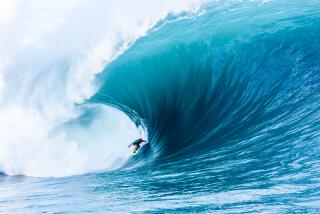Fleeing Paradise: Whirlwind Departure Puts New Spin on South Pacific Idyll
WAYA ISLAND, Fiji — We stayed in Fiji one day too long.
On our last night at the Octopus Resort, we were joined by an obnoxious guest. She blew in, messed the place up and dominated all conversation. Her name was Cyclone Jo.
Three days earlier, we had been
delighted to arrive by boat at this tropical hideaway on the western edge of the Fijian archipelago. Our spacious bure (BOO-ray), a thatch bungalow, was elegant compared with the one we had enjoyed the week before on Nanuya Lailai island. It faced a gleaming white beach and included a private outdoor bathroom, allowing us to shower under the warm sun. The queen bed’s white linens were adorned with a pile of red hibiscus flowers, matching the color and pattern of the curtains fluttering in the four windows.
The meals of fresh fish and curried lamb were tasty. One evening, residents from the nearby village of Nalauwaki entertained us with traditional Fijian song and dance. The next morning, several of us hiked over a jungle ridge, past pigpens and a cemetery, to hear villagers fill the cheery Methodist church with their joyful voices.
It had all been so idyllic.
Then Jo barged ashore, that salty wench. She was carrying some heavy baggage--predatory winds, lashing rains, breakers like avalanches.
On the morning we were to depart, Andrea and I awoke and found the resort’s motorboat sinking in the angry sea. The storm had snapped its mooring line, leaving the craft to founder on the coral barrier reef. We rushed to help workers try to pull the boat from the surf with ropes.
We played tug of war with the ocean for 90 minutes, our hands growing red and blistered. We dodged falling coconuts as they blew from swaying palms overhead. The boat took on more water with each pounding wave. Finally, a breaker burst through the bow and a section of plywood flapped from the frame like the sole of an old shoe. Unable to drag the boat an inch farther, we tied off the lines and let nature have its way.
We retreated to the resort’s restaurant, now encircled by a rising pool of rainwater. I assumed a boat would not be coming for us, and we ordered lunch. Before I finished my tuna sandwich, a woman appeared in the doorway, soaked to the skin and rattled. She was just off the boat from Viti Levu, Fiji’s main island. A routine 90-minute crossing had turned into a five-hour ordeal. Many of the passengers were sick. The boat was now anchored in the roiling bay, waiting for us to board for the return trip to the port of Nadi.
“Don’t go, don’t go,” the woman implored. “I wouldn’t go back right now for a million dollars.”
Six guests were scheduled to leave: Andrea and I, a Danish couple and their 5-year-old son, and a University of Michigan student named Andy. Now that the resort’s motorboat lay wrecked on the beach, the only way out to the dual-engine catamaran was in a small rubber raft. The absence of life jackets and paddles meant more room for our lunacy.
The raft had already made one semi-successful trip from catamaran to shore, losing only two passengers. One managed to climb back in; the other desperately swam through the surf to return to the boat.
When the resort manager said it was our turn, I told him we’d like to stay another night. “Impossible,” he said. The arriving guests had taken all the bungalows. He ordered us into the raft. The Danes refused to go, electing to camp out in the storm. Andy, Andrea and I reluctantly stepped into the pathetic rubber vessel.
A rope 100 yards long hung between a palm tree and the railing at the stern of the bobbing catamaran. Two Fijian men stood in the raft and began pulling us along the rope across the churning sea. Andy and Andrea sat, while I crouched on all fours. Every time the catamaran lurched, the taut rope whacked the side of my face and neck.
“Sit down! Sit down!” Andrea kept yelling. I held my preposterous position, thinking it somehow more stable, as the rope continued to thrash my head.
I looked back at the beach and saw that many of the young European guests had braved the elements to offer us their support. At least that’s what I thought they were doing until several of them whipped out cameras and started shooting. I could already hear the family slide show back in Berlin: “Look, Uncle Wolfgang, here’s a picture of the idiot Americans getting swept out to sea.”
It was low tide, and the jagged coral ahead jutted from the surface like so many shark teeth. The Fijians waited for a surge of water to cover the reef, then pulled madly on the rope. They misjudged the timing and delivered us into the jaws of a mighty wave.
I caught a glimpse of Andy, who already had the look of a goner. Andrea smiled maniacally at the thundering breaker. Our handlers screamed something in Fijian. I tried to recall whether the evacuation provision of my health insurance policy also covered remains.
The crushing surf bucked the raft into the air, and for one terrifying instant it appeared we would be flung into the clutches of the reef. But when we came down, it was water, not coral, smacking the bottom of the raft.
Once we were on board the catamaran, Capt. Osea Namuatique proudly noted that his was the only boat to take on Cyclone Jo. All other skippers had obeyed the Marine Department order to stay in the harbor. He explained that the name of the catamaran, Dau Veivueti, is Fijian for “rescue boat.” It was unclear whether he had risked all to rescue us or our money.
The return cruise was easy--as long as we ignored the howling gale, the horizontal rain and the whitecaps that resembled convulsing icebergs.
“Getting on that boat was the craziest thing I’ve ever done,” Andy said. “Don’t tell my mother.”
NEXT WEEK: Off to New Zealand.
More to Read
Sign up for The Wild
We’ll help you find the best places to hike, bike and run, as well as the perfect silent spots for meditation and yoga.
You may occasionally receive promotional content from the Los Angeles Times.






